 This is not an ordinary Lent. As the season began, the reality of our connectedness with the entire world became more acute, and while the reason for this is not good, this new sense of global community is not necessarily a bad thing. We are all in this together: this is a time for us to think more about our neighbor, even if that neighbor lives in another country, in another continent. And of course, it is a time to reflect upon our local communities, too. This year it is more intense, but Lent is always about the gospel message of mindfulness toward what we do or fail to do for the least of our brothers and sisters. (Matthew 25:31-46) And to be able to do for our brothers and sisters, we must include self-care. This means exercising both caution and common sense (all the time, not just this year.) Lent also challenges us to look within; we are reminded to “return to God with all our heart,” committing to more prayer, sacrifice, and almsgiving. At the moment we may be struggling with how to do that, but we can be creative in our approach, a creativity that includes reflection in discerning our call to deeper reliance, trust, and faith in God. But with the present challenge a bit more ‘in our face,’ we know this Lent is indeed far from ordinary. 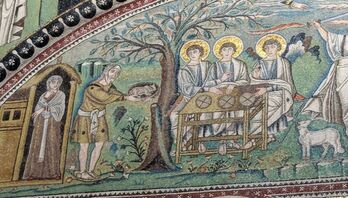 Something intrinsically Lenten is that we give things up, we make sacrifices. What makes this Lent different for most of us is that this year we are not the ones doing the choosing, but rather circumstances around us are compelling us to make them. For example, we have lost access to some entertainment venues, we are being inconvenienced by the inability to find certain items for purchase, and we cannot travel to places we had planned to go. We have to stay confined to our homes when we would rather be out, and some might be sick when they would (of course) rather be well. Many have livelihoods and sources of income jeopardized. We even have to let go of some of the familiar rituals at our houses of worship, compelled to avoid those places altogether for reasons of health and safety. Indeed, we are sacrificing in ways that were never expected, and which we certainly did not choose.  Therefore, rather than panic or get angry over that which we cannot control, (which is just about everything), we can instead learn to accept that our reliance on God must be total. This is not at all a new thing, nor is it something that is only relevant in times of trouble. In fact, this is what our spiritual life has always been about, and it is how we grow in holiness! We must remember that God has always been with His people and that He is always in control. When we say this we emphatically do not mean that He is behind whatever catastrophe befalls His people. Rather, He is with us through everything to guide, teach, and comfort, offering His mercy and healing. It means that in the end, we will be with Him in Heaven never suffering or shedding another tear (Revelation 21:4), a reality which is not promised here on earth. To grasp this in some way, we must look to the culmination of Lent, the suffering, death, and resurrection of Jesus, the very cornerstone of our faith.  In that regard, it may help to include in our prayer the Stations of the Cross or the Sorrowful Mysteries of the Rosary. We can ‘apply’ our suffering from the unbidden restrictions now placed upon us to Jesus carrying all that angst and pain with Him in the garden: He did not choose the cup without a lot of anguish, but He realized He had to trust the Father to accomplish salvation. Meditating on the scourging at the pillar and crowning with thorns can aid in our reflection upon the ways we are called to beg God’s mercy for anything we have done to hurt another, helping us prepare for the Sacrament of Reconciliation. As we consider Jesus carrying the Cross (and falling) we can reflect upon our own crosses, asking for assistance and then moving outward to help others carry theirs, enhancing our works of mercy. And as we meditate upon the crucifixion of Jesus, we can stand at the foot of the cross with Mary asking help with pain and loss, and assistance with putting our present reality in perspective with the great gift Jesus gave us by dying so that we might have life. 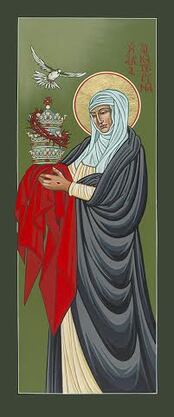 Indeed this Lent is not ordinary. However with all the restrictions and cautions surrounding us, instead of focusing on what we cannot do, let us look to the unexpected opportunity being offered: we have a unique opportunity to delve into Lent in a deeper way than perhaps ever before. We have before us the invitation to more quiet reflection and prayer, to new ways to reach out to those who may be alone or worse off than we are, to be more selfless by not over-buying, leaving food and supplies for the next person; we have an invitation to penance and sacrifice, to fasting in unexpected ways, and to learn reliance upon God with completely new depth. It is an opportunity to grow in holiness. Indeed this is not an ordinary Lent. But then, no Lent ever is. May we put our trust in the Lord, relying on Him to put our minds and hearts at peace! May we call upon the Holy Spirit for discernment so that we proceed according to the gospel in all we do! May we join in the unity of prayer, asking for protection and healing for all people around the world! And may we enter into the Passion of Jesus anew, so that we accept the invitation to holiness! Let us continue to meet in the Heart of Jesus! Peace! ©Michele L. Catanese Images: 1. The Earth, part of the Viriditas Triptych, an inset of the icon called Viriditas - Finding God in All Things, by Fr. William Hart McNichols. You can find both at https://fineartamerica.com/featured/viriditas-finding-god-in-all-things-william-hart-mcnichols.html 2. My photo, the story of Abraham, a mosaic in San Vitale Basilica, Ravenna, Italy. On the left you can see Sarah laughing when overhearing the angels (center) foretell her pregnancy and Abraham giving a lamb sacrificed from his flock to feed them; they appear as angels, but are the Holy Trinity. (Note the bread on the table, a Eucharistic reference!) To the right is Abraham after God told him not to sacrifice his son, Isaac, something he almost did out of obedience to God, who was teaching Isaac about the depths of faith. (Note the lamb, another Eucharistic reference.) 3. Icon, Blessed Julian of Norwich who famously said, "All shall be well." (That is what is written on the scroll she is holding.) 4. Painting, The Agony in the Garden, by Paul Gaugan. The agony of Jesus in the Garden of Gethsemane is the first Sorrowful Mystery of the Rosary. 5. Icon, St. Catherine of Siena - Guardian of the Papacy, by Fr. William Hart McNichols. St. Catherine was born during the Black Plague and spent much of her ministry taking care of the ill from that disease as well as those with leprosy. May she intercede for us! You can find this icon at https://fineartamerica.com/featured/st-catherine-of-siena-guardian-of-the-papacy-288-william-hart-mcnichols.html NOTE: In compliance with GDPR rules, I wish to make it clear that I do not gather any information on any of my readers at any time. 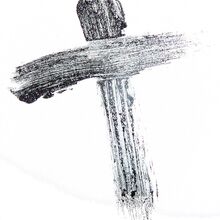 Lent, of course, begins with ashes. Having received them yearly and also having had the privilege of distributing them at Mass many times, I can say that ashes are truly a messy affair. When the minister of the ashes, whether clergy or lay, attempts to place them on a forehead, it is quite tricky to use the ‘right’ amount and to keep the ashes from flaking all over the face, or worse, the clothes, of the recipient. Then there is the challenge throughout the day to avoid brushing against the ashes on one's own forehead accidentally, making more of a mess. Thus, ashes are a messy business indeed. But that is what makes it so appropriate, and thus, such a powerful reminder to ourselves throughout Ash Wednesday; we receive ashes upon our foreheads as a sign of our penitence. They are not there as a sign to others that we are already holy, but are a sign to keep us focused on our desire to grow personally, as a community of loved sinners in solidarity with our brothers and sisters in the Body of Christ, and of course, with Jesus. It is to remind us that the season of Lent is different than what came before, and – if I may suggest – it can be a time to remember that life is messy. Being a Christian is messy insofar as we are called to roll up our sleeves and act as a response to Jesus: living the gospel is messy. Also true is that God loves us as we are, in all our messiness. Trying to grow in faith, wanting to love God better, that is, to grow in holiness, is messy because it involves the work of trying and failing, reconciling, and trying again. However, because this is true, we must remember that the season of Lent is actually a joyful occasion. 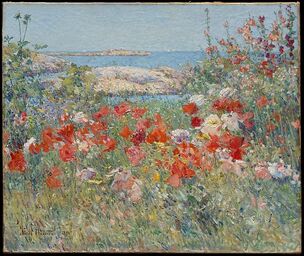 That God would call us deeper by giving us the opportunity to repent, to become more generous with our time, talent, and treasure, and to grow in holiness, is a cause for rejoicing. In the words of Psalm 136, “Give thanks to the Lord, for he is good, for his mercy endures forever.” The Psalmist makes a unique declaration of praise, joyfully extolling the boundless mercy of God. The realization that we are loved sinners should move us to desire wholeheartedly to make a deeper response of love to God. This response includes growing closer to God with greater intimacy through our prayer, asking forgiveness for our sinfulness through fasting, prayer and the Sacrament of Reconciliation, and movement outward in action to help our neighbors through works of mercy and almsgiving. But even in trying to fulfill these and our chosen Lenten offerings, we should do it all with a joyful heart. In the gospel reading of the Ash Wednesday liturgy Jesus said: “When you fast, do not look gloomy like the hypocrites. They neglect their appearance, so that they may appear to others to be fasting…. But when you fast, anoint your head and wash your face so that you may not appear to be fasting….” (Matthew 6: 16-18) While Jesus was telling His followers not to be hypocrites so as to impress people by our ‘holiness,’ it also seems to be a reminder to keep a balance between the sorrow we have over our sin and the sin of the world, and our gratitude and joy for the greatness of God’s mercy. 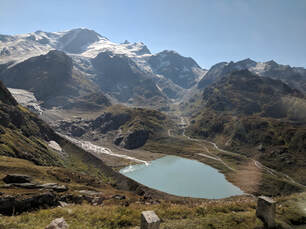 It would be good to pray with the gospel of Ash Wednesday (Matthew 6:1-8,16-18) reflecting on the purpose of the ashes we received even though they are no longer on our foreheads, but rather are now worn in our hearts. The Son of God, Jesus, entered into the messiness of the world when He became one of us, but He was not gloomy or depressive. Rather, His message had great energy: the joy of healing, wholeness, and mercy were the gifts He offered. It is for this broken world with its complicated and messy people that He suffered and died, acts unfathomable in their merciful, loving depth. We can also pray with Psalm 136, adding our own verses, always ending with the phrase, “…for His mercy endures forever.” This Psalm puts our response to God in perspective: we rejoice in the knowledge that His love and mercy are creative, without limit, eternal. Finally, we can join with St. Francis of Assisi in his Praises of God as a reminder that God is with us in this messy world, a cause for joy and a response of gratitude and praise:  You are holy, Lord, the only God, and your deeds are wonderful. You are strong. You are great. You are the Most High, You are almighty. You, holy Father, are King of heaven and earth. You are Three and One, Lord God, all good. You are Good, all Good, supreme Good, Lord God, living and true. You are love, You are wisdom. You are humility, You are endurance. You are rest, You are peace. You are joy and gladness, You are justice and moderation. You are all our riches, and you suffice for us. You are beauty, You are gentleness. You are the protector, You are the guardian and defender. You are courage, You are our haven and our hope. You are our faith, our great consolation. You are our eternal life, great and wonderful Lord, God almighty, Merciful Savior. 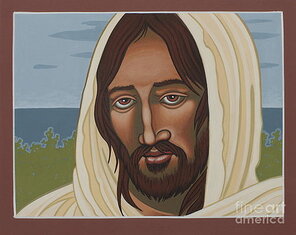 May we have the courage to stay faithful to our Lenten commitments to increased prayer, abstinence, fasting, works of mercy, and almsgiving! May we call upon the intercession of Mary our Mother, St. Joseph, and St. Francis to guide us as we seek to joyfully live and share the gospel message of Jesus! May we have no fear of entering into the lives of those in need with works of mercy, justice and peace! And may we journey through Lent with joyful, grateful hearts! Let us continue to meet in the heart of Jesus! Peace! ©Michele L. Catanese Images: 1. Charcoal: Ashes. 2. Painting: Celia Thaxter’s Garden, Isles of Shoals, Maine (1890) by Childe Hassam. The vibrancy of the flowers and the beauty of the scene gives joyful praise to God. You can find more on this painting at https://www.metmuseum.org/art/collection/search/14930 3. My photo: glacial lake in the Alps, Switzerland. "Mountains and hills praise the Lord!" (Daniel 3:75) This is another great prayer of praise to use in the same way I suggested with Psalm 136. You can add your own invocations and end with "praise and exalt Him above all forever" as the Canticle does. 4. Painting, St. Francis of Assisi, by Jusepe de Ribera, 1591-1652. Museum of Fine Arts, Budapest Hungary. 5. Painted image, The Galilean Jesus by Fr. William Hart McNichols. You can find this image at https://fineartamerica.com/featured/the-galilean-jesus-266-william-hart-mcnichols.html Note: In compliance with GDPR rules, I wish to make it clear that I do not gather any information on any of my readers at any time. |
Heart Speaks to Heart
|

 RSS Feed
RSS Feed

